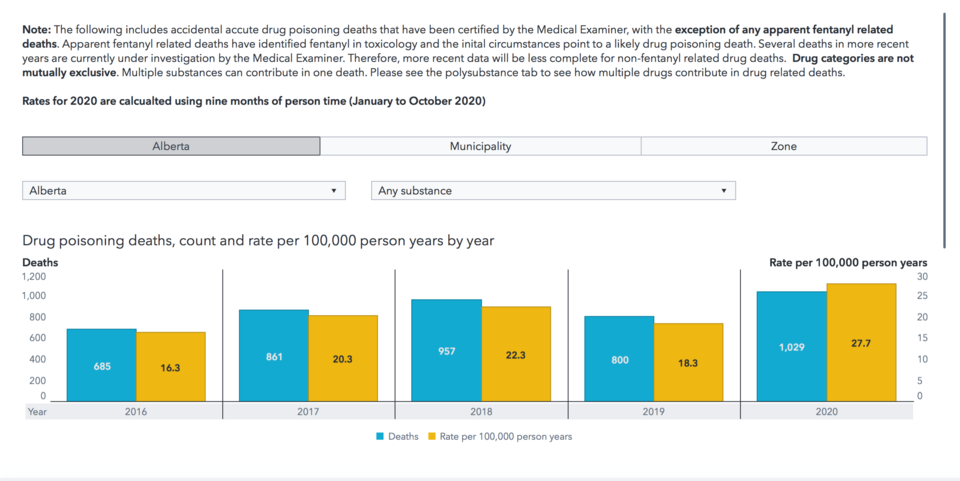Alberta is on track to record the most opioid deaths it has ever recorded this year after a major spike in accidental opioid poisoning between January and October.
According to new provincial data, 904 Albertans died during that time frame. That's compared to 627 deaths in all of 2019. In 2018, there were 806 deaths.
July 2020 was the deadliest month on record since data collection started in 2016, with 142 deaths related to opioids; from July to October this year, 443 people in Alberta died from unintentional opioid poisoning.
Jason Luan, associate minister of mental health and addictions, said the number of deaths is awful.
"Every life lost is too many," Luan said.
"Those are people who are family members, colleagues, members of our community. It's awful."
Alberta Chief Medical Officer of Health Deena Hinshaw offered her condolences to the families who lost loved ones.
“It is a sad reminder that while COVID-19 is a serious and deadly pandemic, it is not the only public health crisis impacting our families and communities,” Hinshaw said.
On Friday afternoon, Alberta Premier Jason Kenney revealed the grim new data and launched a new Alberta Substance Use Surveillance System, which tracks substance use data from across the province.
Kenney said opioid poisoning deaths peaked in July. EMS responded to 2,118 opioid-related events across the province between July and October.
The premier said the pandemic has had a significant impact on those who are struggling with addiction, and said some of the unintended consequences of much-needed public health guidelines to slow the spread of COVID-19 may have had a negative impact on mental illness and those struggling with addiction.
"We believe that some of that, particularly with respect to the spike in opioid drug overdoses earlier this year, was in part the result of government response to COVID-19," Kenney said, adding that by April they had "course-corrected."
"We must learn from this. We must avoid these kind of mistakes as we go forward."
Kenney said earlier lockdown measures contributed to these deaths - the closure of residential treatment programs and subsequent limiting of space once they reopened "ruptured" treatment plans. The suspension of opioid dependency clinics may have also caused a spike in deaths, which Kenney said he regrets.
At the beginning of the pandemic, government rules also prevented support groups like Narcotics Anonymous and Alcoholics Anonymous from holding indoor meetings, but the government has since reversed course and allowed them to meet with safety protocols in place, like masks and physical distancing.
Another factor Kenney said was contributing to the spike in opioid-related deaths is that CERB money, while well-intended and important, is in some cases being put toward drug consumption and causing overdoses. But critics say CERB may not be the major reason deaths are increasing.
Elaine Hyshka, Assistant Professor, School of Public Health, tweeted that overdose deaths were increasing in March, before people could apply for CERB payments.
"The United Nations Office on Drugs and Crimes has reported that border closures are disrupting illegal drug supplies, leading to a more dangerous and volatile market," Hyshka noted.
"Toxicology data from the BC Coroner's office during COVID-19 shows that people are dying with higher than average fentanyl concentrations in their bloodstream."
While CERB may have been a factor, Hyshka said it is unlikely the main driver behind the spike.
The premier said there is a fine balance between trying to keep services open for those in need and keeping an economy afloat, keeping people employed, while imposing restrictions to help slow the spread of COVID-19. Kenney said it would be grossly irresponsible to remove all COVID-19 restrictions, given cases were growing exponentially before the latest restrictions. However, the government is trying to find a balance between lockdown restrictions and causing a mental health and addiction spike in the province.
While numbers have spiked across the board, Kenney said Indigenous Albertans have been the hardest-hit in the recent surge of accidental opioid poisoning deaths. He attributed that to people who had been living in cities with many resources returning to reserves during the pandemic, where there are fewer facilities and services available to support them.
More data
The new Alberta Substance Use Surveillance System dashboard will include more data than just opioid-related deaths, and will also report on all substance use deaths.
"The effects of additions extend far beyond opioids," Kenney said.
The new dashboard will replace the traditional quarterly reports that were issued on opioid-related deaths and emergency responses and will include more data that can be searched by region, age, sex and type of drug. Information on deaths related to many different substances, like alcohol and cocaine, will be included. Some of the data, like accidental substance-related fatalities and EMS calls will be updated on a monthly basis.
The dashboard also includes data from opioid treatment centres, emergency room visits and hospitalizations.



